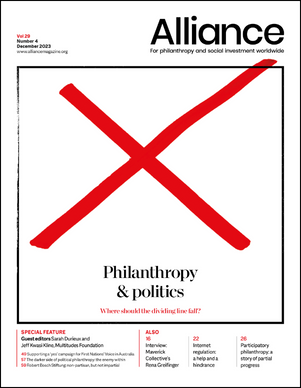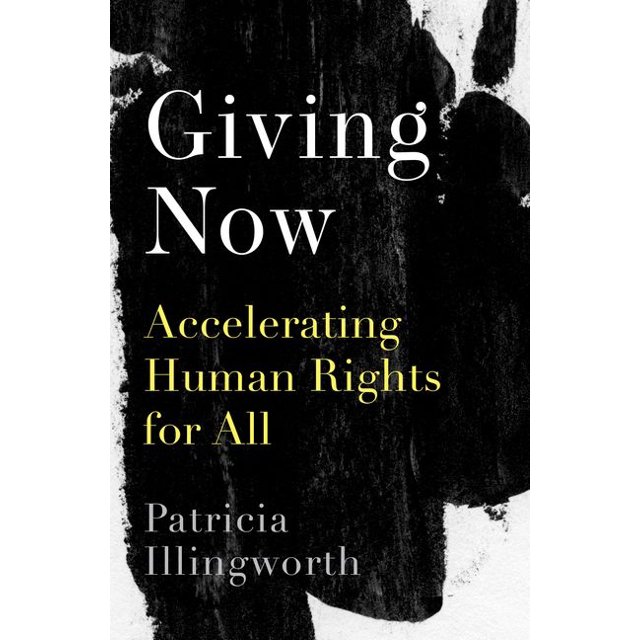Reviewed by Michael Seberich, managing director, Wider Sense
The basic idea of Patricia Illingworth’s book Giving Now shapes the conversation of modern philanthropy in the context of human rights. Observing that ‘human rights provide a single, theoretical, practical, and comprehensive framework for the nonprofit sector’ (p130), she structures her case of the human rights responsibility of all philanthropy focusing on the grantmaking of foundations, (mega)donors and fundraisers. She does so with legal and philosophical rigour and a wealth of references and case studies.
The 2011 UN Guiding Principles on Business and Human Rights are the starting point for Illingworth’s analysis. She walks the reader through various cases of tainted philanthropy, like the now repeatedly documented Sackler, Koch and Epstein cases, but also controversial fundraising approaches. In her well-structured argument, she shows how a human rights perspective would have prevented grantees and donors from making ethical mistakes. In addition, she shows how philanthropy can boost its role in democracy based on this approach.
To reinforce her argument of a human-rights-centred approach to philanthropy, Illingworth includes one of the first, comprehensive – as much as time allows – analyses on the effects of the Covid 19 pandemic and the Black Lives Matter movement, which she refers to as the ‘twin pandemics’. The book does a tremendous service to the sector in assembling data on the quantitative and qualitative dimensions of philanthropy during the crisis. The author shows, based on these societal emergencies, how Martin Luther King’s ‘urgency of now’ has become a predicament for philanthropy. She argues for a grounding of philanthropic actions in the human rights responsibilities of philanthropy. She also argues that philanthropy could have done a lot more in this crisis.
The analysis is based on experiences in philanthropy in the US and a selection of English-speaking countries and raises a challenge that we face in the (global) philanthropy discourse repeatedly. Illingworth argues: ‘It is difficult to justify the charitable tax deduction on the “doing the job of the state” reasoning when philanthropy is disruptive, or the state withdraws its support for a particular public good’ (p96). The role of philanthropy, for instance, in welfare, social market economy states in Europe has different nuances when it comes to the ‘advancement of the public good’. Leat and Anheiher made a strong case for ‘creative philanthropy’ as long ago as 2006 but a comparative analysis of these legitimisations of philanthropy beyond western schools of thought would be of help for this debate.
The book does not recognise some current developments in the sector. Trust-based philanthropy or modern grantmaking are exploring more transparent, more participatory, more inclusive forms of giving. Illingworth does not reference these developments in philanthropy, however, the human rights due diligence she develops at the end of the book should be given increasing prominence in these movements in the future.
I struggle with the absoluteness of the observation, ‘philanthropists cannot meet their human rights responsibilities without effective giving’ (p45) and the conclusion that the school of effective altruism is congruent with the human rights lens in philanthropy. Yes, philanthropy needs to be effective, but human rights are not only about health, education and equity – which Illingworth focuses on. Human rights based on the UN Declaration, for instance, are also about freely participating in cultural life, arts, and the sciences. Trying to balance effectiveness, creativity and other human rights is a dilemma that grantmaking professionals navigate every day.
Giving Now is a must-read in the philanthropy and the nonprofit sector overall. Applying the human rights lens to philanthropy makes sense. The author demonstrates that it can be a hands-on tool for grantmakers and fundraisers. It also opens a new chapter in the debate on what guides philanthropy and how change can be driven forward.
About the book
Author: Patricia Illingworth
Published by: Oxford University Press, 2022
To order: patriciaillingworth.com/giving-now




Comments (0)